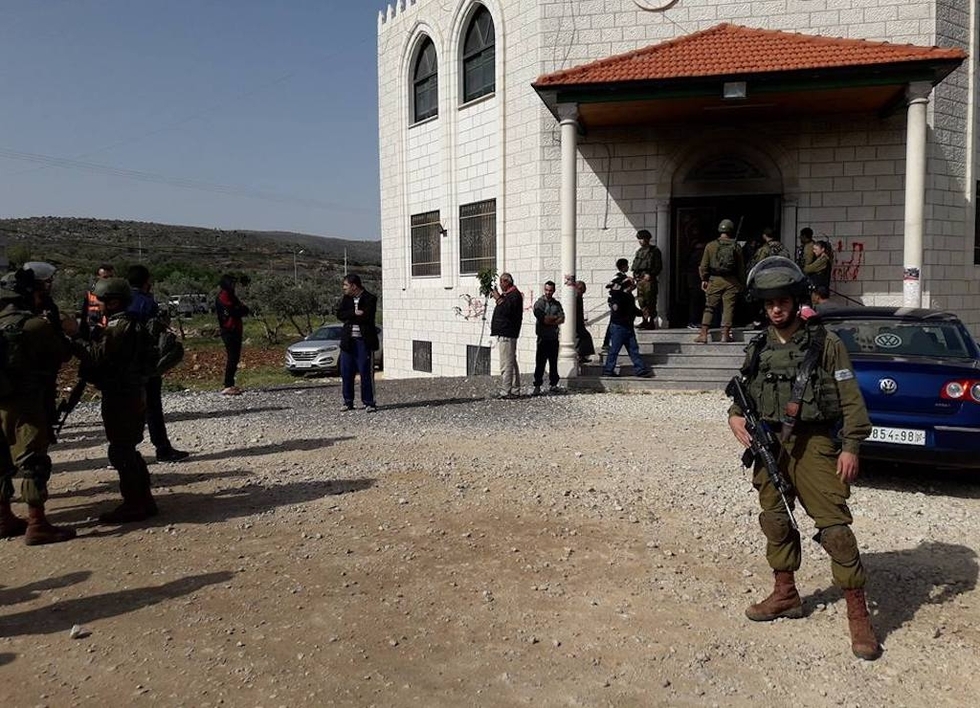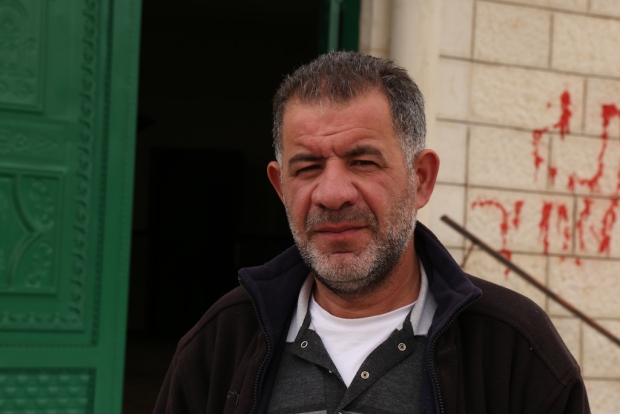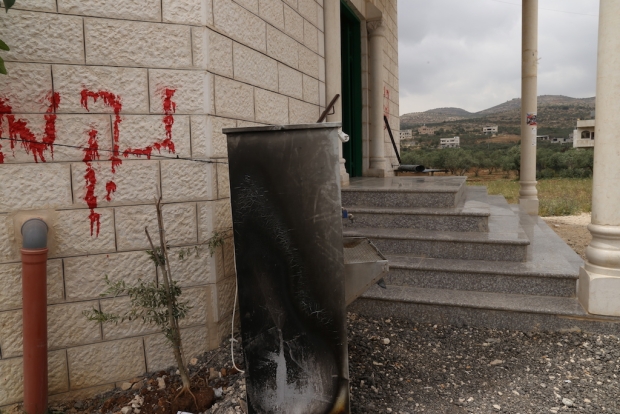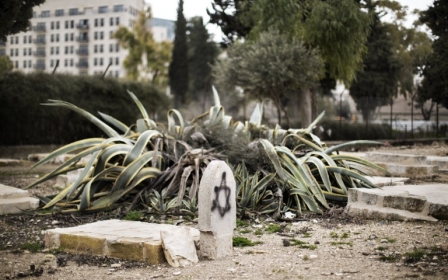Palestinians reel from spike in racist 'price tag' attacks by settlers

NABLUS, Occupied West Bank - The attack came before dawn prayers. Israeli settlers slipped unseen into the northern occupied West Bank village of Aqraba, broke down the door to the village's mosque, and set the building on fire.
Before fleeing, they used red paint to spray the words "price tag" and "revenge" on the outside walls of the mosque.
A week after the 13 April attack, Palestinians in the Ramallah-area village of Burqa woke up to find the tyres of dozens of cars slashed and racist anti-Arab graffiti sprayed on the walls of homes and shops and on car doors.
Three days on, the words "death to Arabs" were sprayed across the Jerusalem-area West Bank village of Beit Iksa.
These are just three of the most recent crimes by fundamentalist illegal settlers, who began the attacks in 2008 as the "price tag" for the removal of illegal outposts in the West Bank.
Go to any village ... and they will tell you about dozens and dozens of such attacks
- Yusuf Deiriya, Palestinian activist
To Palestinians, they are simply hate crimes. And their frequency is rising.
The Shin Bet, Israel's internal intelligence agency, said this week that there have been 13 attacks in the first four months of this year - more than in the whole of 2017, when there were eight, according to the agency.
Yet Palestinians who bear the brunt of the violence tell a different tale, that there have been "dozens and dozens" of attacks, and they are almost daily.
Attacks every day
The village of Aqraba and its surrounding farmland spans about 127,000 acres, or 51,000 hectares. Under the Oslo Accords, about two thirds of that land was designated Area C - meaning Israel was given full civilian and military control.
That designation has led to huge areas of village land confiscated by Israel for illegal settlement expansion.
Yusuf Deiriya, a local activist, said that about 11 Israeli settlements and outposts are built around Aqraba and surrounding villages, making the area particularly susceptible to settler attacks.
"Just a few kilometres from here is Qusra village, where settlers killed a man last year," Deiriya told Middle East Eye as he pointed south.
"And if you just keep going on the same road you will see Duma, where the Dawabsheh family was killed when settlers fire-bombed their house.
"So when they tried to burn our mosque down, we were not even surprised," Deiriya said, standing in front of the Sheikh Saadeh mosque, the bright red graffiti still on the walls.
Deiriya disputed the numbers of attacks reported by the Shin Bet.
"The true number is so much higher than that," he said. "Go to any village here in the Nablus area, in Ramallah, and Jerusalem, and they will tell you about dozens and dozens of such attacks."
Scrolling through a WhatsApp group of local activists who monitor settler attacks, Deiriya began to list the names of the villages which had experienced attacks similar to the one on Aqraba earlier this month.
"This morning alone there were two attacks in the Nablus area," he said. "These are a daily occurence, and they have been for years."
Dedication to the cause
Among the West Bank's 3.1 million Palestinians are an estimated 600,000 illegal Israelis living in Jewish-only settlements, many of whom move to the occupied territory for political and religious reasons. Among these exists a fundamentalist movement that claims the entire West Bank, which it refers to as "Judea and Samaria," as Israeli territory, and stakes its claim through violence.
The origins of the violent movement have been traced back to a yeshiva, or religious school, in the notoriously violent Nablus-area settlement of Yitzhar, where rabbis would reportedly encourage students to attack Palestinians and their property.
The school was previously run by Rabbi Yitzhak Ginzburg, who was charged in 2003 with incitement to racism for his book Tipul Shoresh, which called for Palestinians to be expelled from Israel and the Palestinian territory. The charges were dropped when he later issued a "clarification letter".
Now, almost a decade later, the attacks have grown into a fully fledged movement, with entire groups of young Jewish fundamentalists dedicated to the cause.
While the Israeli government categorises "price tag" attacks separately from other forms of settler violence, rights groups argue that the attacks are just one part of typical settler violence.
"'Price tag' is a catchy name, but how do you define it exactly?" said Gilad Grossman, of the Israeli human rights group Yesh Din.
"These actions, meant to frighten Palestinians in their homes and villages and to defy law enforcement, are just part of what we define as ideologically motivated violence."
According to Grossman, "price tag" attacks are no different to harming Palestinian crops and animals.
"It's all part of an attempt to take over more Palestinian lands and to harm and frighten Palestinians and show them who's the boss," he said, adding that since the beginning of the year, the group has documented 45 cases of ideologically motivated violence, about a quarter of which were "price tags".
Grossman told MEE the spike in attacks could be attributed to three factors: "In part it's due to law enforcement acts against right-wing extremists, in part it's a reaction to fatal terror attacks [by Palestinians], and I guess in part due to the ideology of extremists."
Some locals speculate that the attack on the mosque was revenge for the stabbing and killing of an Israeli settler in March by Aqraba resident Abd al-Rahman Bani Fadel.
For Deiriya, however, the implication that "price tag" attacks are retaliatory in their nature and are exacted out of revenge is offensive.
"Fine, maybe you can say this was revenge for what Bani Fadel did, but what did Muhammad Abu Khdeir do that he deserved to be burned alive? What did 18-month old Ali Dawabsheh do?" he asked.
"What did the people of Luban al-Sharqiya, of Izkaka, of Beit Iska, of Jalud, of Sawiya, of Turmus Ayya, of Sinjil, what did they do to have their villages attacked? This not revenge. It is terrorism."
Israeli probes 'just saving face'
Israeli police have opened an investigation into the vandalism and attempted arson at Aqraba's mosque.
"The attack happened around 3am. By 6am the Israeli police and civilian administration were here," Deiriya told MEE. But he doubted anything would come of the investigation.
"The Israelis always open investigations, and rarely does anything come out of it," he said. "It's all just to save face and keep up the ruse that they are actually concerned for our safety."
According to Yesh Din, Israeli authorities in the past three years served indictments in only 8.2 percent of cases of Israeli settlers committing anti-Palestinian crimes in the occupied West Bank.
In a 2017 report, Israeli NGO B'Tselem said the violent actions of settlers are "part of a broader strategy in which the state colludes, as it stands to benefit from the result".
"Over time, this unchecked violence is gradually driving Palestinians from more and more locations in the West Bank, making it easier for the state to take over land and resources," the group said.
Deiriya, like most Palestinians, doubts that any serious action will be taken against those involved.
"I wish there was actually a true system of laws and justice in Israel, as they say, to prosecute the people who burned our mosque and to protect us against these attacks," he said.
"Ultimately, this is an occupation, and when these soldiers are not 'investigating' these attacks they are enforcing the government's theft of our land to build walls, settlements, and checkpoints.
"When they take off their uniforms, they go to their homes which are built on stolen land, so what is the difference?"
New MEE newsletter: Jerusalem Dispatch
Sign up to get the latest insights and analysis on Israel-Palestine, alongside Turkey Unpacked and other MEE newsletters
Middle East Eye delivers independent and unrivalled coverage and analysis of the Middle East, North Africa and beyond. To learn more about republishing this content and the associated fees, please fill out this form. More about MEE can be found here.






